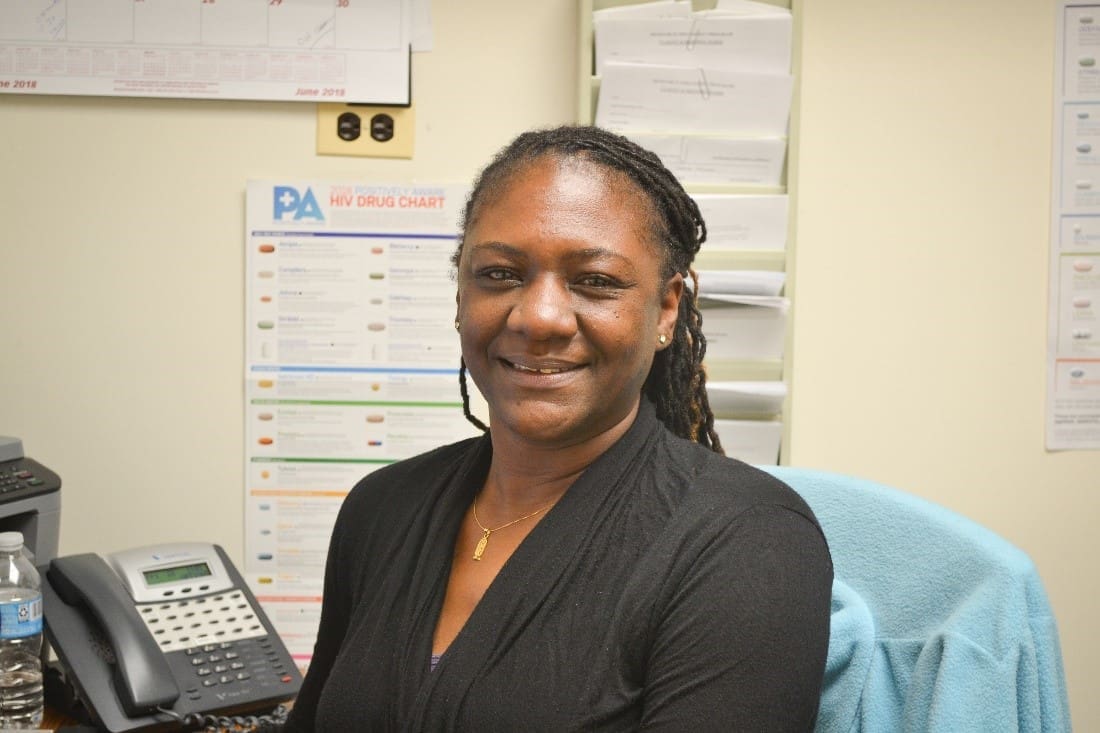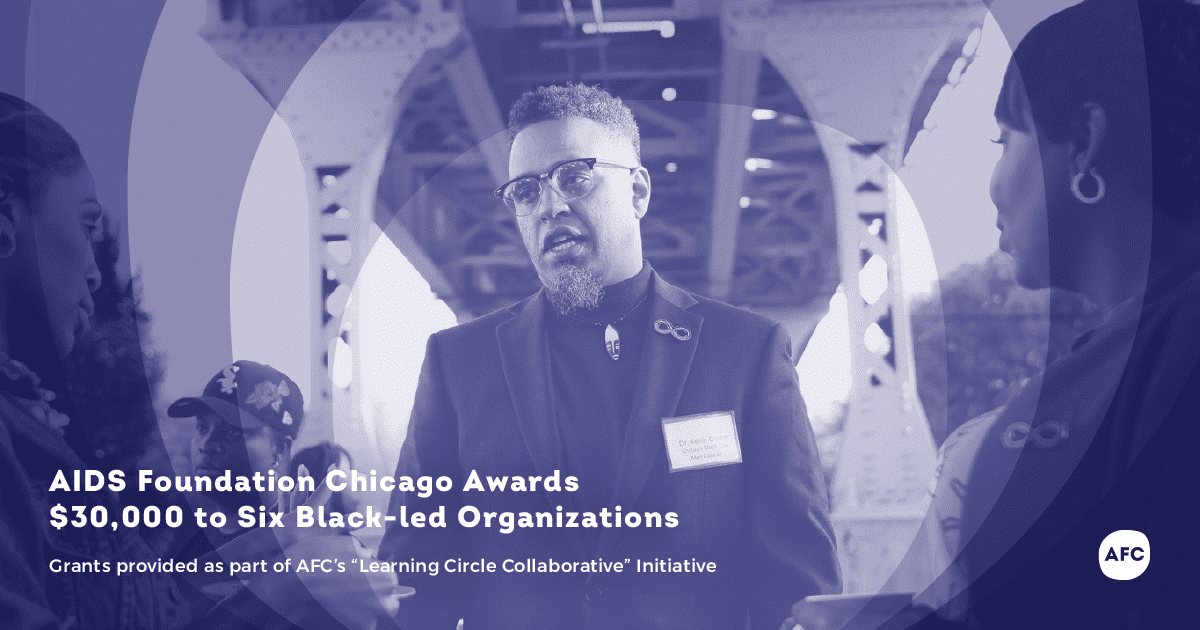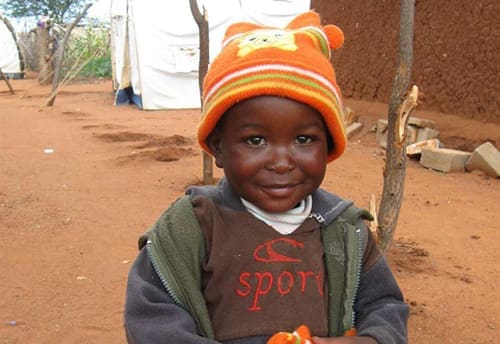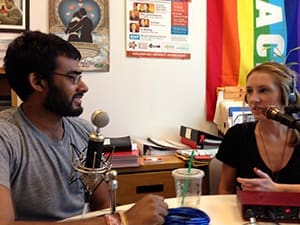 The AIDS Foundation of Chicago (AFC) coordinates 135 case managers throughout the Chicago metropolitan area to support clients who are living with HIV and related chronic diseases. Case managers are there to connect with clients directly and help them achieve goals such as obtaining stable housing or getting connected to a medical provider that may help them reach an undetectable viral load. Because they do so much for our communities, AFC’s Communications Coordinator, Raven Feagins, sat down with a case manager from Chicago House and Social Service Agency – an organization dedicated to supporting the well-being of people living with HIV, the LGBTQ community and other underrepresented communities – to learn more about what goes into helping the hundreds of clients AFC’s partner agencies see every year.
The AIDS Foundation of Chicago (AFC) coordinates 135 case managers throughout the Chicago metropolitan area to support clients who are living with HIV and related chronic diseases. Case managers are there to connect with clients directly and help them achieve goals such as obtaining stable housing or getting connected to a medical provider that may help them reach an undetectable viral load. Because they do so much for our communities, AFC’s Communications Coordinator, Raven Feagins, sat down with a case manager from Chicago House and Social Service Agency – an organization dedicated to supporting the well-being of people living with HIV, the LGBTQ community and other underrepresented communities – to learn more about what goes into helping the hundreds of clients AFC’s partner agencies see every year.
Lakethia Conner is a passionate, family-oriented mother of one who resides in Chicago’s Roger Park neighborhood. She was born and raised in Chicago’s Cabrini-Green homes, where she grew to understand the value of a close-knit community as well as the importance of having access to the necessary resources to thrive and live a healthy life. She attributes her upbringing, along with lessons learned about acceptance and equality, from her grandmother, to her desire to enter the world of social services where she has been working as a medical case manager for the past 2 years.
Q: How would you describe case management to people who don’t already know?
A: There’s different types of case management, but overall (under the umbrella) a case manager is someone who basically advocates, provides support and connects their clients to services.
A medical case manager is someone that is involved in their client’s all-around life but focuses on medical to make sure that they’re adherent to doctor’s appointments, medication and just in general getting healthier.
Q: How many clients do you work with now?
A: Right now, I have 33 individuals. I am also supervising Chicago House’s new program of non-medical case management, so that is a case load of 40 I believe.
Q: What kind of things do your clients come to you for?
A: It’s a very wide range! My case load has ranges from some self-sufficient people to people experiencing homelessness. I get requests for rental assistance – whether a person is going from homelessness to housing, whether it’s subsidized housing or some type of housing program … or maybe they lost their job and need assistance to help pay rent and utilities until they find another position. Health insurance is also a big, big thing – there’s a lot of questions regarding insurance. Also, food services – whether it’s hot meals or food pantries.
Q: Is housing one of the larger issues that you have to tackle?
A: It is. Working previously at Housing Opportunities for Women with the housing-first model and being in my position as the patient navigator … I’ve witnessed that once a person is housed, everything sort of falls into place. But I know that Chicago has limited affordable housing, which sucks, so yeah, housing is one of the most difficult pieces.
Q: What is a typical day like for you here?
A: It depends of which day of the week. I’m co-located at UIC, which has two medical providers who do morning clinics 2 – 3 times a week. Clinics are days that the doctors are in the clinic and seeing patients/clients. I’m available during clinic hours so clients could do everything on the same day.
Mondays there’s the afternoon clinics, so Monday mornings I’ll come in and there’s always work to do. I check my voicemails because clients … they’ll call at midnight and some of them will just be like, “I just want to address this first thing Monday morning.” So, my Mondays are just catching up on all of those messages. If there’s a fire, giving that attention, but there’s always case notes to do, there’s always phone calls to return or someone to track down. Then lunch (hopefully) happens, then afternoon clinics.
Tuesday there is morning clinic, so I know if any of my clients or anyone that needs assistance with ADAP or anything, they will be in that day. I try to prepare the paperwork because if there’s five clients waiting on me, it’s easier to just have the paperwork done and that just makes the day and time just move. Then, I’m able to see everyone without them waiting a long time or getting irritated. I try to be prepared.
I try to do all of my appointments here at the clinic or one of the Chicago House locations, but when I did have a few homeless clients with no income, I would go meet them out in the community.
It’s basically just always being here and being available. There’s always paperwork and always things to enter and issues that come up.
Q: What motivates you to continue doing this work?
A: It’s easy for me. I had a career change from certified medical assistant phlebotomist and an EMT and I managed an outpatient county clinic for four years or so.
My grandma always called me the helper, so this work comes so naturally for me. And to get paid for it, it’s great. I think burnout is always on the edge, but self-care helps with that.
Q: What do you do for self-care?
A: It depends how the wind blows! I have a good sense of humor – and I try to keep that. Also, baths are really, really relaxing — and sunshine. If there’s no sunshine, I can have off days. Just give me some sunshine, a glass of wine and a bath and I’m good.
Self-care is the most important and I think my clients … they understand and so does my family. If I feel that I don’t have the best resources or attention at that time, I will call you back when I know I can be that person. Also shutting my phone off. I will do it in a heartbeat now. It took me a while to do, but … yeah. Boundaries.
Q: What’s the most challenging part about your job?
A: The most challenging for me, it’s when I give a person every tool they need and they’re just not utilizing them. That’s challenging for me. It makes me step back and re-assess and have real and honest conversations with the person to figure out what the issues are. I’m a problem-solver so just being honest with the person is almost getting to the root of the problem. Once they know you’re sincere and know that you really care, they’ll usually open up.
Q: What’s one of the most rewarding parts about your job?
A: The rewarding thing is when someone utilizes all of the tools and just becomes self-sufficient! Just to see growth in an individual is like, “Yay!”
To learn more about case management and other services coordinated by AFC, please click here to visit our case management page.
This interview has been condensed and edited for brevity and clarity.



